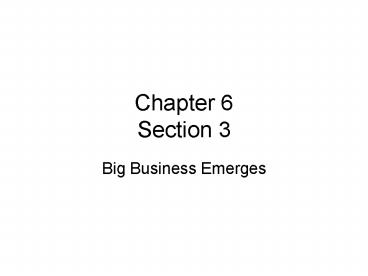Chapter 6 Section 3 - PowerPoint PPT Presentation
1 / 18
Title:
Chapter 6 Section 3
Description:
Carnegie. Carnegie libraries. Carnegie Hall. Carnegie-Mellon U. Tuskegee Institute ... Carnegie. Growth and Consolidation ... U. S. Steel buying Carnegie Steel ... – PowerPoint PPT presentation
Number of Views:32
Avg rating:3.0/5.0
Title: Chapter 6 Section 3
1
Chapter 6Section 3
- Big Business Emerges
2
Andrew Carnegie
3
Andrew Carnegie
- One of the first industrial moguls to make his
own fortune - 1899 Carnegie Steel
- Largest steel company in U. S.
4
J. P. Morgan
5
J. P. Morgan
- Banker
- Owned U. S. Steel
- 1901 bought Carnegie Steel
- Worlds largest business
- corporation
6
John D. Rockefeller
7
John D. Rockefeller
- Owned Standard Oil
- Monopoly in oil
8
Robber Barons
- Critical term used to describe the great
industrialists - Captains of Industry?
9
- Rockefeller
- University of Chicago
- Land for UN
- Medical research
- Rockefeller U
- Johns Hopkins
- Carnegie
- Carnegie libraries
- Carnegie Hall
- Carnegie-Mellon U
- Tuskegee Institute
10
Business Strategies
- Vertical Integration/Consolidation
- Buy out all suppliers
- Carnegie
11
Business Strategies
- Horizontal Integration/Consolidation
- Buy out all competitors
- Carnegie
12
Growth and Consolidation
- MONOPOLY firm buys all competitors and has
control over an industry - Production
- Quality
- Wages
- Prices
13
- Holding Company monopoly that buy out the stock
of other companies - Banker J. P. Morgan and U. S. Steel buying
Carnegie Steel
14
- MERGER the company that results from one
corporation buying out the stock of another
corporation
15
- TRUST a corporation make up of many companies
that receive certificates entitling them to
dividends on profits earned - Rockefeller and Standard Oil monopoly
16
Social Darwinism and Big Business
- Theory used to justify efforts of the
millionaires - survival of the fittest to justify
laissez-faire - Government should not interfere with business
17
Sherman Anti-Trust Act
- 1890
- Unsuccessful attempt by Congress to regulate big
business - Did not clearly define trust which made
enforcement difficult
18
- GOAL of BIG BUSINESS control or eliminate
competition to create profits - GOAL of GOVERNMENT allow more competition































